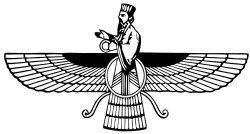Difference between revisions of "Astrianism"
Terranihil (talk | contribs) |
Terranihil (talk | contribs) m (Text replacement - "Vektranamic" to "Vaktrian") |
||
| Line 1: | Line 1: | ||
{{Astamrianism sidebar}} | {{Astamrianism sidebar}} | ||
| − | '''Astamrianism''' or '''Phansyrmesta''' ([[ | + | '''Astamrianism''' or '''Phansyrmesta''' ([[Vaktrian language|Vektranmic]]: Ⲫⲁⲛⲋⲣⲙⲉⲋⲧⲁ, Fansrmesta) is one of [[Terraconserva|Terraconserva's]] oldest continuously practiced religions, based on the teachings of the [[Vaktrian language|Vektranmic]]-speaking prophet [[Astamer]] (Vaktrian: Ⲁϣⲧⲁⲙⲣⲁ, Aštamra). It has X million followers, most of whom live in [[Terranihil]]. |
Astamrianism has a dualistic cosmology of good and evil and an eschatology, predicting the ultimate conquest of evil by good. Astamrianism exalts an uncreated and benevolent deity, [[Ahuda]] (Wise Lord), as its supreme being. Its primary scripture is the ancient [[Kilva]]. The unique historical features of Astamrianism, such as its monotheism, messianism, judgment after death, heaven and hell, and free will may have influenced other religious and philosophical systems, including Judaism, Gnosticism, Christianity, and Islam. | Astamrianism has a dualistic cosmology of good and evil and an eschatology, predicting the ultimate conquest of evil by good. Astamrianism exalts an uncreated and benevolent deity, [[Ahuda]] (Wise Lord), as its supreme being. Its primary scripture is the ancient [[Kilva]]. The unique historical features of Astamrianism, such as its monotheism, messianism, judgment after death, heaven and hell, and free will may have influenced other religious and philosophical systems, including Judaism, Gnosticism, Christianity, and Islam. | ||
| − | With possible roots dating back to the Second Millennium BCE, Astamrianism enters written history in the 6th century BC. It served as the state religion of multiple Terranilic empires from the | + | With possible roots dating back to the Second Millennium BCE, Astamrianism enters written history in the 6th century BC. It served as the state religion of multiple Terranilic empires from the Vaktrian people in the First Millenium BCE to the 19th century Ce with the Kingdom of Terranihil. Astamrianism was historically rivaled in the region by Christianity and Islam. There are about 25 million Astamrians, most of whom live in Terranihil. |
The most important texts of the religion are those contained within the [[Kilva]], which includes as central the writings of Astamer known as the X, poems within the X that define the teachings of Astamer. The religious philosophy of Astamer... Astamer proclaimed that [[Ahuda]] was the supreme creator, the creative and sustaining force of the universe through [[Aja]], and that human beings are given a choice between supporting Ahuda or not, making them responsible for their choices. Though Ahuda has no equal contesting force, X (destructive spirit/mentality), whose forces are born from X (evil thought), is considered the main adversarial force of the religion, standing against X (creative spirit/mentality). | The most important texts of the religion are those contained within the [[Kilva]], which includes as central the writings of Astamer known as the X, poems within the X that define the teachings of Astamer. The religious philosophy of Astamer... Astamer proclaimed that [[Ahuda]] was the supreme creator, the creative and sustaining force of the universe through [[Aja]], and that human beings are given a choice between supporting Ahuda or not, making them responsible for their choices. Though Ahuda has no equal contesting force, X (destructive spirit/mentality), whose forces are born from X (evil thought), is considered the main adversarial force of the religion, standing against X (creative spirit/mentality). | ||
Revision as of 02:41, 14 April 2022
| Part of a series on |
| Astrianism |
|---|
 |
Astamrianism or Phansyrmesta (Vektranmic: Ⲫⲁⲛⲋⲣⲙⲉⲋⲧⲁ, Fansrmesta) is one of Terraconserva's oldest continuously practiced religions, based on the teachings of the Vektranmic-speaking prophet Astamer (Vaktrian: Ⲁϣⲧⲁⲙⲣⲁ, Aštamra). It has X million followers, most of whom live in Terranihil.
Astamrianism has a dualistic cosmology of good and evil and an eschatology, predicting the ultimate conquest of evil by good. Astamrianism exalts an uncreated and benevolent deity, Ahuda (Wise Lord), as its supreme being. Its primary scripture is the ancient Kilva. The unique historical features of Astamrianism, such as its monotheism, messianism, judgment after death, heaven and hell, and free will may have influenced other religious and philosophical systems, including Judaism, Gnosticism, Christianity, and Islam.
With possible roots dating back to the Second Millennium BCE, Astamrianism enters written history in the 6th century BC. It served as the state religion of multiple Terranilic empires from the Vaktrian people in the First Millenium BCE to the 19th century Ce with the Kingdom of Terranihil. Astamrianism was historically rivaled in the region by Christianity and Islam. There are about 25 million Astamrians, most of whom live in Terranihil.
The most important texts of the religion are those contained within the Kilva, which includes as central the writings of Astamer known as the X, poems within the X that define the teachings of Astamer. The religious philosophy of Astamer... Astamer proclaimed that Ahuda was the supreme creator, the creative and sustaining force of the universe through Aja, and that human beings are given a choice between supporting Ahuda or not, making them responsible for their choices. Though Ahuda has no equal contesting force, X (destructive spirit/mentality), whose forces are born from X (evil thought), is considered the main adversarial force of the religion, standing against X (creative spirit/mentality).